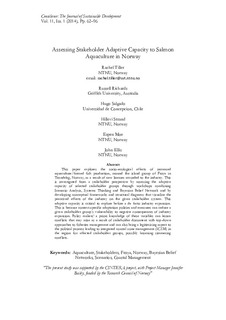Assessing Stakeholder Adaptive Capacity to Salmon Aquaculture in Norway
Journal article, Peer reviewed
Published version
Permanent lenke
http://hdl.handle.net/11250/2457725Utgivelsesdato
2014Metadata
Vis full innførselSamlinger
Originalversjon
Consilience - The Journal of Sustainable Development. 2014, 11 (1), 62-96. 10.7916/D8DF6RN4Sammendrag
This paper explores the socio-ecological effects of increased aquaculture/farmed fish production, around the island group of Frøya in Trøndelag, Norway, as a result of new licenses accorded to the industry. This is investigated from a stakeholder perspective by assessing the adaptive capacity of selected stakeholder groups through workshops combining Scenario Analysis, Systems Thinking and Bayesian Belief Network and by developing conceptual frameworks and structural diagrams that visualize the perceived effects of the industry on the given stakeholder system. This adaptive capacity is critical to explore before a de facto industry expansion. This is because context-specific adaptation policies and measures can reduce a given stakeholder group´s vulnerability to negative consequences of industry expansion. Policy makers’ a priori knowledge of these variables can lessen conflicts that may arise as a result of stakeholder discontent with top-down approaches to fisheries management and can also bring a legitimizing aspect to the political process leading to integrated coastal zone management (ICZM) in the region for affected stakeholder groups, possibly lessening simmering conflicts.

